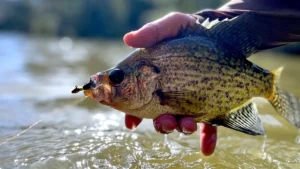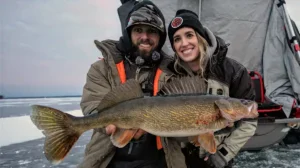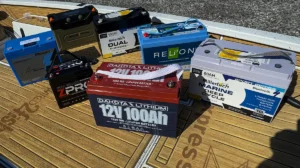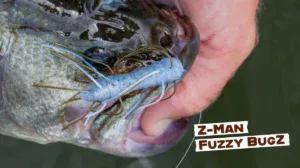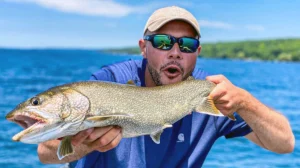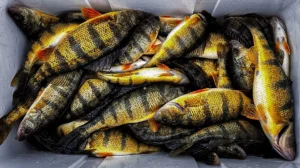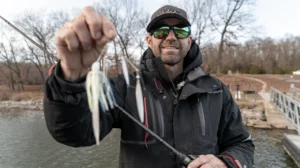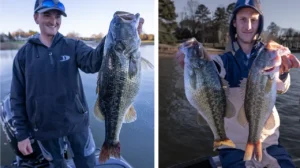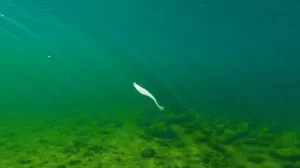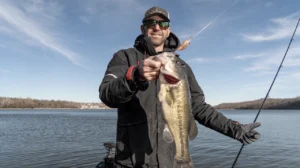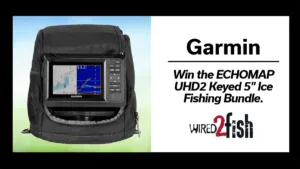Consolidated and easy to find, the fall is arguably the best time of the year to find and catch crappies in the Great Lakes States. Wired2fish’s Ryan DeChaine provides a detailed rundown on how he locates huge schools of fall crappies using the gamut of fish finder technologies and how to catch them using a simple selection of lures that excel in deeper water.
FEATURED TACKLE (retail links)
- GLIDING JIG – Rapala Jigging Rap
- FINESSE JIG – VMC Tungsten Probe Jig, 1/16-ounce
- JIG TIPPING – Berkley PowerBait Panfish Nibbles
- ROD – 13 Fishing Omen Panfish Trout, 6’9” light-power, fast-action (OPTS69L)
- REEL – 13 Fishing Kalon C Spinning Reel (KLC-6.2-2.0)
- LINE – Sufix 832 Advanced Superline, 6-pound
*Additional links below.
While most would vote spring as the best time of the year to catch crappies, DeChaine argues that the fall is more consistent regarding fish location. In many northern natural lakes, crappies move into basin areas as early as mid-September and start forming the largest schools of the year. And unlike cover-oriented fish, basin crappies are sitting ducks on fish finders, so you can easily position yourself on or near the school and present your lure to hundreds, if not thousands, of fish.
BOAT & ELECTRONICS
- FISH FINDER (bow stack) – Humminbird APEX 13 CHIRP MEGA SI+ G3
- FISH FINDER (console) – Humminbird SOLIX 15 CHIRP MEGA SI+ G3
- 360 SONAR – Humminbird MEGA 360 Imaging
- LIVE SONAR – Humminbird MEGA Live
- TROLLING MOTOR – Minn Kota Ultrex 112lb-36V Trolling Motor
- BOW ELECTRONICS MOUNT – Precision Sonar Over and Under Bow Mount for Deck
- BASS BOAT – Lund 2075 Pro-V Bass
- MOTOR – Mercury Pro XS 250hp
- TRUCK – Toyota Tundra (2014 shown), The New Tundra
With deep water comes new challenges, namely the ability to quickly get your lure down to the fish in deep water. DeChaine shares his favorite lures for deep-water crappie hunting. Just as importantly, he demonstrates how to trigger fish by engaging with them on his sonar. Forward-facing sonar has been a game-changer here, as seeing fish interact with your bait in real-time allows you to manipulate your presentation to trigger the bite. Rod action and line significantly impact bait performance and hooking retention in deep water. DeChaine explains how a light braid, coupled with a light-power rod with a slower taper, improves performance.
A word of caution. Barotrauma is a risk to panfish caught from deeper water. DeChaine focuses his efforts on shallower lakes or basins, usually 25 feet or less, to prevent killing fish he doesn’t intend to keep.


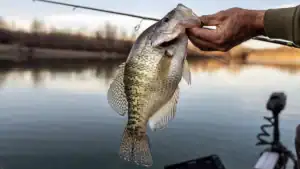
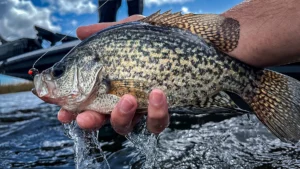
![[VIDEO] Filleting Bluegill Made Easy: Tips and Tricks](https://www.wired2fish.com/wp-content/uploads/2025/05/bluegill-cleaning-300x169.webp)
